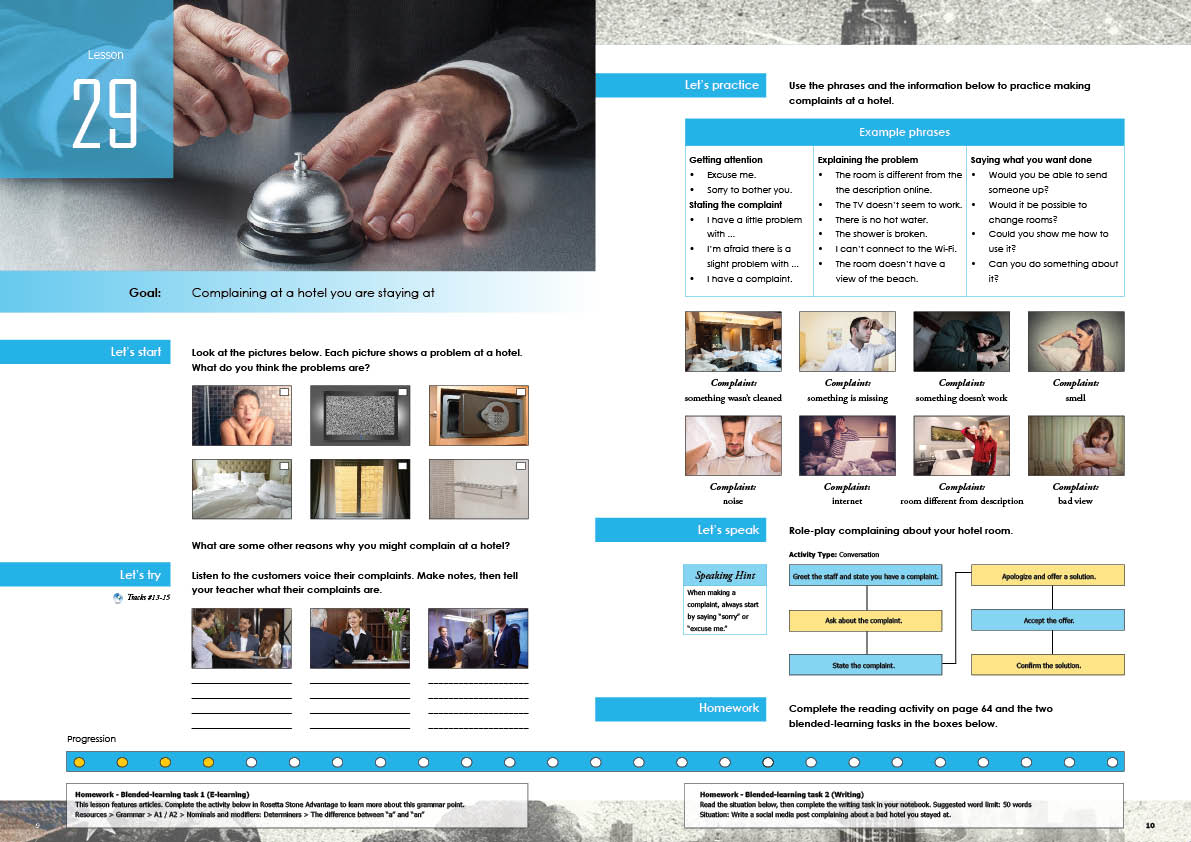
Manuals > General English > Rosetta Stone Advantage > Elementary - Book 3 > Lesson 29
< Previous Lesson | Next Lesson >

By the end of the lesson, the student should be able to complain about problems while staying at a hotel.
Communication strategies:
The student should be able to complain about a problem by following the 4 steps below:
1) get the staff's attention
2) State there is a problem
3) explain the problem
4) state how you would like the problem fixed
e.g.
A) Excuse me. Sorry to bother you. But there is a problem with my room.
B) What seems to be the problem?
A) The room wasn’t cleaned properly. The bed wasn’t made and there is garbage on the floor. Would it be possible to change rooms?
B) I’m very sorry about that. Let me see what rooms are available. I can change you to room #7, if you like.
A) Thank you.
B) Please wait here. I’ll have the bellman move your items to the new room.
A) OK.
B) We are terribly sorry for the inconvenience.
Words and rules:
- The student should be able to state some common hotel problems e.g. the shower is broken
- The student should be able to make requests using different registers e.g. Can you fix it? / Would you be able to repair it?
Appropriateness:
Non-verbal behaviour: The student should know how to get someone's attention.
Register: It's common to use a polite register when you are complaining about something, however you can use a casual / rude register if you are angry.
Social rules: NA
Cultural references: NA
Track #13
Excuse me, but there’s a problem with the heating in my room.
Track #14
I’m afraid I have to make a complaint. Some money has gone missing
from my room.
Track #15
I’m afraid there’s a slight problem with my room – the bed hasn’t been made.
Because the lesson touches on the topic of hotels, you are welcome to introduce some of the following vocabulary if you like.
1) bellboy (n) e.g. The bellboy will help you with that.
2) housekeeping (n) e.g. We will send up housekeeping.
3) linen (n) e.g. Can you change the linens?
4) a mess (n) e.g. The room is a mess.
5) missing (adj) e.g. The remote is missing.
6) smell (n) e.g. There is a strange smell.
7) humming (n) e.g. The A/C is making a loud humming noise.
8) drip (v) e.g. The tap won't stop dripping.
9) work (v) e.g. The TV doesn't work.
10) stuck (adj) e.g. the door is stuck.
Option 1:
Difficulty ★★
Type:
Let's start - Warm-up discussion
Purpose:
Steering the student into the goal of the lesson before opening the book.
Method: Before you open the book, talk to the student about some hotels they have stayed at. Which was the best / worst?
“Naruhodo” Point
a little / very (too)
We usually use "a little" instead of "very" or "too" when making complaints.
The room is very dirty
The room is a little dirty.
Extra questions you might like to ask in the lesson
- How can I help you?
- What can I do for you?
- How may I be of assistance?
- May I have your room number, please?
- Is there anything else I can do for you today, sir?
Let’s start
Look at the pictures below. Each picture shows a problem at a hotel. What do you think the problems are?
Top left: The hot water doesn’t work
Top middle: The TV is broken
Top right: The safe doesn’t close
Bottom left: The bed wasn’t made
Bottom middle: There is no view
Bottom right: There are no towels
What are some other reasons why you might complain at a hotel?
1) Something is missing
2) Something is broken
3) Something is different to what it should be
Let’s try
Track #13
There’s a problem with the heating in my room.
Track #14
Some money has gone missing from my room.
Track #15
The bed hasn’t been made.
Let’s practice
Problem: Something wasn’t cleaned.
A) Excuse me. Sorry to bother you. But there is a problem with my room.
B) What seems to be the problem?
A) The room wasn’t cleaned properly. The bed wasn’t made and there is garbage on the floor. Would it be possible to change rooms?
B) I’m very sorry about that. Let me see what rooms are available. I can change you to room #7, if you like.
A) Thank you.
B) Please wait here. I’ll have the bellman move your items to the new room.
A) OK.
B) We are terribly sorry for the inconvenience.
Let’s speak
Pretty much the same as the example role-play above